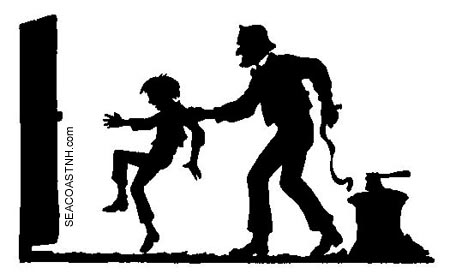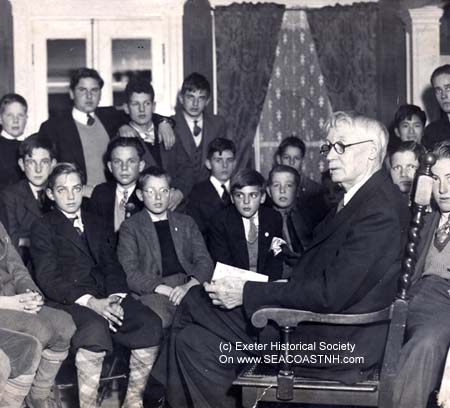|
FRESH STUFF DAILY |
|
|
||
|
|
||
|
|
||
|
SEE ALL SIGNED BOOKS by J. Dennis Robinson click here |
||
Page 2 of 3
Like Aldrich’s hero Tom Bailey, Shute named his main character after himself, using a childhood nickname. Shute surrounded his protagonist with a gang of rambunctious boys with names like Newt, Beany, Pewt, Nibby, Bug, Fuzzy, Skinny, Whack and Boog – many fashioned after real Exeter personalities like editor Templeton. In 1901, borrowing another idea from Aldrich and Twain, Shute began writing, not only with the voice of a young boy, but with the appropriate misspellings and poor grammar. Some parents and teachers complained about Plupy’s bad influence on boys, but Shute’s irreverent humor was the formula for success. Judge Shute claimed he had discovered his childhood "diry" from the 1860s in a trunk in the attic. His writing style was so convincing that many readers believed it was true. When these stories were collected into The Real Diary of a Real Boy (1902), the book became an instant bestseller. Shute’s work appeared widely in national magazines like Boys Life and The Saturday Evening Post just as the 20th century dawned. As technology advanced, industry boomed, immigration increased and cities expanded, a wave of nostalgia washed over the Atlantic states and spread westward. This "colonial revival," expressed in everything from art to architecture redefined the past as good. The wild "Roaring Twenties," Prohibition, the Great Depression and two world wars only proved the future was a dark and dangerous place. White Americans longed for the rural, Anglo-Christian simplicity of the "Good Old Days," whether they had really existed or not. Plupy and his street gang rode the nostalgia wave to success. And, like the Young Rascals of the movies that followed, they also represented the lost innocent days of youth, appealing to both children and adults. Unlike Twain, little of Shute’s work is remarkable today. The vernacular writing grows quickly tiresome and, despite a good deal of fighting and mischief, the stories are often flat and predictable. In one 1905 series in the Saturday Evening Post, Plupy writes about his boring summer in Exeter, New Hampshire to his friend Beany, who is out of town. Plupy complains that there is nothing to do but swim and fish and hang out with the same tiresome friends. When the group decides to put on a minstrel show, Plupy is left out of the cast. The show is so bad, that no one attends anyway.
Shute, whose left leg was weak due to a childhood bout of polio, also suffered the pangs of peer rejection. He did not shy away from depicting the cruelty and bigotry of his fellow vandals. The group often preyed on the on animals, the weak and the elderly. They smoked corn-silk cigars, rang doorbells, removed gates, overturned outhouses, started fires, set off fireworks, and poured "peppersass" into the cream cakes at the local bakery. A mediocre student, Shute preferred the company of Exeter fellows to the classroom. He did not excel at Harvard and preferred to spend weekends at home in Exeter. A single paragraph from the 1905 Saturday Evening Post demonstrates why Shute’s writing is both lovable to some and forgettable to others. Plupy writes: "Fatty is going to have a party. most of the fellers are invited xcept me and the girls two. Fatty is mad with me because I told Tady that he said things about the paddys that got him a licking. Fatty will be sorry he dident invite me to his party. i woodent have went if he had invited me. i don’t care for his party ennyway. did you ever catch a bull frog with a peace of split bamboo. if you havent you dont know what fun is. i wood ruther do that than go to a party. i dont care for Fattys old party ennyway. i woodent go if i was invited. When are you coming home. Wright soon. Yours very respectively, Plupy" Both Twain and Aldrich lost their fathers when they were boys, traveled widely and found early success as authors. Shute, by comparison, had a happy middle-class home life, emerged as an author in middle-age, and stuck to his hometown like glue on a toilet seat. He attended the town’s public schools, then graduated from Phillips Exeter Academy and Harvard. Despite his prolific career, he considered his writing as a hobby and his literary success as a "gigantic joke". His greatest joy, besides being "an Exeter boy," was playing clarinet and performing with the Exeter Brass Band. For decades he joined the summer concerts at the Exeter Bandstand in the center of town just across from the law office on Water Street that he shared with his son. If the reading public loved the fictional Plupy Shute, the citizens of Exeter loved the real Plupy more. Although his soap opera style rarely rises to the level of satire or social commentary, his self-deprecating sense of humor is endlessly winning. CONTINUE Plupy Shute Biography Please visit these SeacoastNH.com ad partners.
News about Portsmouth from Fosters.com |
| Saturday, April 27, 2024 |


|
Copyright ® 1996-2020 SeacoastNH.com. All rights reserved. Privacy Statement
Site maintained by ad-cetera graphics

 Link Free or Die
Link Free or Die




















